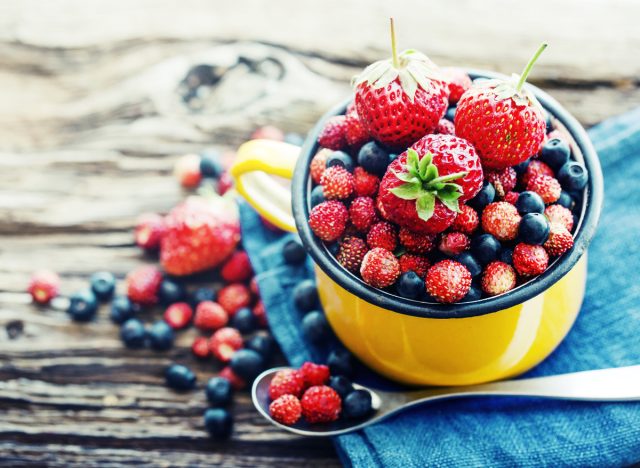It's natural for your brain to change over time as you get older. During your later years of life, you're more likely to experience shifts in your cognition that affect your reasoning, planning, and problem-solving skills, as well as your memory and ability to understand complex concepts. And while slight cognitive changes are generally considered to be a normal aspect of aging, some people undergo more serious age-related cognitive decline. But whether your brain sustains mild or major changes as you grow older, your diet can play a large role in helping to slow down the impact aging can have on your brain.
To better understand which foods are especially good for supporting brain health, we spoke with Dr. Kiran F. Rajneesh, a neurologist at The Ohio State University Wexner Medical Center, associate professor in the Department of Neurology at the Ohio State University College of Medicine, and director of the Neurological Pain Division at Ohio State. Read on to learn which brain-healthy foods he often recommends to his patients.
Fish
If you're a seafood lover who wants to focus on fortifying your brain health, incorporating more fish into your diet—especially fatty fish—is a helpful eating habit to adopt.
"Two servings of fish per week are great for brain health since omega fatty acids are helpful in rebuilding myelin, [otherwise known as the] insulation around the brain," says Dr. Rajneesh. In fact, one 2020 report in Frontiers in Aging Neuroscience found that eating fish can help improve memory over time and overall cognition in healthy individuals.
Nuts
For those who enjoy snacking on a handful of nuts, you may want to make it a regular habit. One study from Advances in Nutrition found that college students ages 18–25 who consumed 60 grams of walnuts on a daily basis had better cognitive performance and critical thinking than those who didn't eat walnuts.
"If able to tolerate nuts, they help repair damage to the brain by replenishing fatty acids as well vitamin E," says Rajneesh.
Berries

Eating fresh fruit and vegetables on a daily basis is something Dr. Rajneesh recommends to his patients because many of these foods "have vitamin C as well as helpful antioxidants to repair brain tissue and cell membranes."
In addition, he specifically recommends adding berries to your diet because these "have micronutrients, micro-elements, and high levels of antioxidants that are helpful to repair and restore function to the brain."
Turmeric
When you need some extra flavor added to your dinner or if you're a fan of golden milk lattes, you may want to incorporate more turmeric into your daily routine.
"Turmeric's active ingredient curcumin is known to be anti-aging, anti-cancer, and helpful for maintaining memory," says Dr. Rajneesh.
Though these eating tips do help promote overall brain health, if you suspect that you or your loved ones might be experiencing significant cognitive changes, the best preventative action you can take is to speak to your doctor. Your physician will be able to provide you with options that are tailored to your unique brain chemistry and health needs. In the meantime, incorporating more of these brain-healthy foods into your diet is a great place to start.
No comments:
Post a Comment